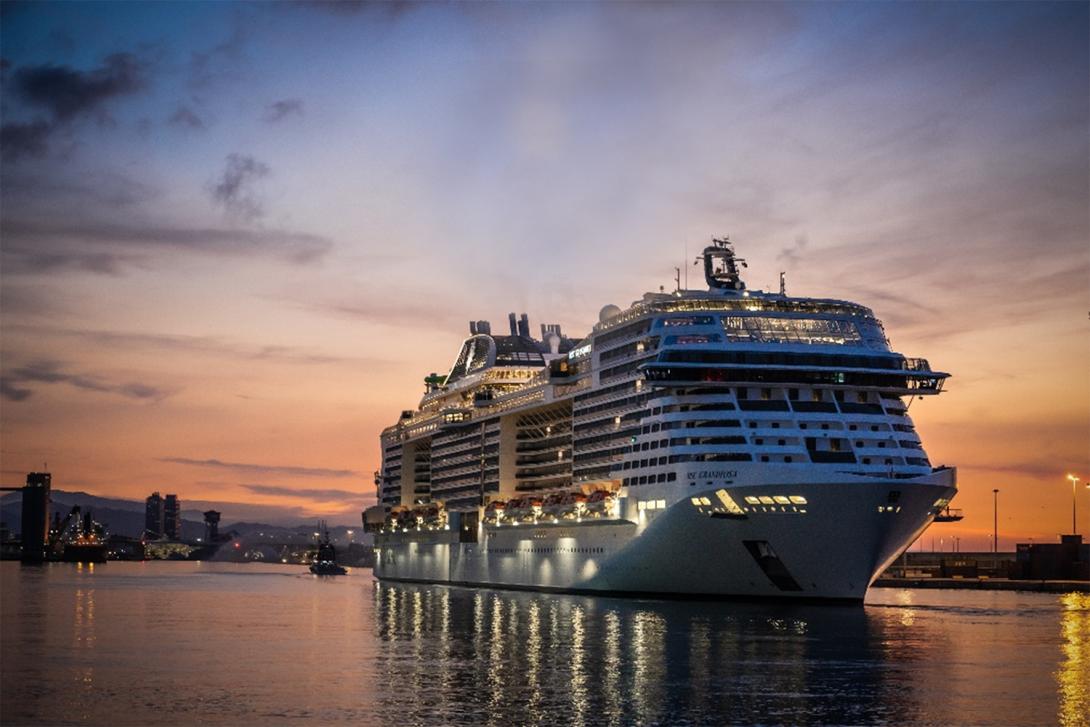The Port of Barcelona will resume cruise activity in a safe, staggered and sustainable way
After the stoppage caused by the Covid-19 pandemic, today marked the operation of the first cruise ship —the MSC Grandiosa— to arrive in Barcelona.

The Port of Barcelona has worked with shipping companies and other players in the cruise sector to resume activity in a staggered, sustainable, and above all safe way, both for crew and passengers, for the workers of the Port Community and for the citizens of Barcelona.
Cruise companies that operate regularly in the Port of Barcelona will arrive gradually, with MSC Cruises and its MSC Grandiosa kicking off the 2021 season today, 26 June. Next to arrive will be TUI's Mein Schiff 2, scheduled for 29 June. Costa Cruceros' Costa Smeralda arrives on 5 July, then Aida Cruises' AidaPerla on 9 July. Cruise ships of U.S. companies will only begin to arrive in August. The first will be Royal Caribbean's Harmony of the Seas on 15 August. The arrival of American companies will help to normalise flight connections with the United States from El Prat Airport, which had been stopped by the pandemic.
“As a Port, we are aware of our responsibility to ensure public health. We therefore consider that activity had to resume once the number of infections and vaccination levels in Spain allowed”, said Carla Salvadó, Deputy Manager of Commercial and Marketing at the Port of Barcelona. Regarding the expected number of port calls for the season, “we cannot give a figure at this stage because we are still working with the shipping companies to gradually bring in ships. Plus, we have worked to bring the least polluting ships currently sailing to the Port of Barcelona”, added the Port manager.
Health guarantees
As regards the health measures implemented by the cruise industry, ports, cruise terminals and shipping companies have been working for months to implement the most stringent of protocols for the safety of passengers, crew and, of course, city dwellers. For the Port of Barcelona and the terminals, “the work done to date means that we can ensure the safety of passengers, crews, port workers and citizens from a health point of view, but we can also guarantee that, in spite of the new protocols, ship operations will be nimble and the infrastructures and services will work perfectly”, added Carla Salvadó.
The protocol to be followed by the Port of Barcelona has been agreed by Foreign Health, which answers to the Spanish Ministry of Health. In addition to basic hygiene measures, such as wearing a mask, using hand sanitizer or maintaining social distancing, cruise companies are required to report on their health plan as approved by the flag state, and to ensure implementation. This includes specific information about the medical resources available on the ship and diagnostic capacity on board as well as information on the cruise company’s procedures prior to boarding passengers, among other data.
Shipping companies are also required to have insurance for passengers and crew to cover all accommodation, maintenance and medical care costs for asymptomatic patients not requiring hospitalisation. This is also the case for close contacts who have to quarantine, and hospital admissions for positive cases, where necessary. This cover includes all transport needs, including air medical transfers and repatriation if necessary, and guarantees to keep the public health system from being overloaded, in the words of Fernando Pacheco, General Manager of MSC Cruises in Spain, who also pointed out that the MSC Grandiosa “is one of the most modern and environmentally advanced ships in our fleet.” Pacheco explained that the MSC Seashore is scheduled to leave the shipyards at the end of next July and that this ship, the most technologically advanced of the shipping company, will be positioned in Barcelona to travel around the Mediterranean at the beginning of August.
Terminals also have their own health measures for passengers as well as protocols for disinfecting luggage and facilities once each operation has been completed. Ventilation, disinfection and proper distribution of passenger flows will be key to the process.
Port improvements
While cruise activity was stopped for months, the Port of Barcelona never stopped working, taking the opportunity to perform improvement works in the area of the Adossat wharf for this traffic segment. It invested €2.6 million in improving the mooring system at cruise terminals to increase the safety of berthing operations. Work was also done to improve accessibility to the area, enlarging Gate 2 to the Adossat Wharf, doubling accesses or checkpoint controls and relocating and refurbishing the roundabout to distribute traffic to all cruise terminals. These works meant an investment of €1.22 million.
Furthermore, between February 2020 and April 2021 the consolidation of Phase III was completed as part of the complex long-term action to enlarge the Adossat wharf. This works project will enable construction of the new cruise terminal awarded to MSC during the latest Port Board of Directors meeting. The investment in this case was €2.6 million.
More than 9,000 jobs
The cruise ships that will arrive this year will provide a considerable boost to the recovery of a sector that was plunged into a serious crisis by the Covid-19 pandemic. The cruise industry employs more than 9,000 people in Barcelona and has an annual turnover of €1.083 billion in Catalonia, contributing €562 million to Catalan GDP each year.
In 2019, cruise passengers accounted for 10.4% of tourists who spent the night in Barcelona. They also made a greater-than-average contribution to the area's economy. The average expenditure of visitors who spent the night in 2019 in this destination was €69.90 per day. It is estimated that cruise passengers in turnaround spend some €230 per day. Cruise passengers in transit, who spend an average of four hours at the destination, typically spend €57 each. In 2019, 57% of cruise passengers passing through the Port of Barcelona were in turnaround.


